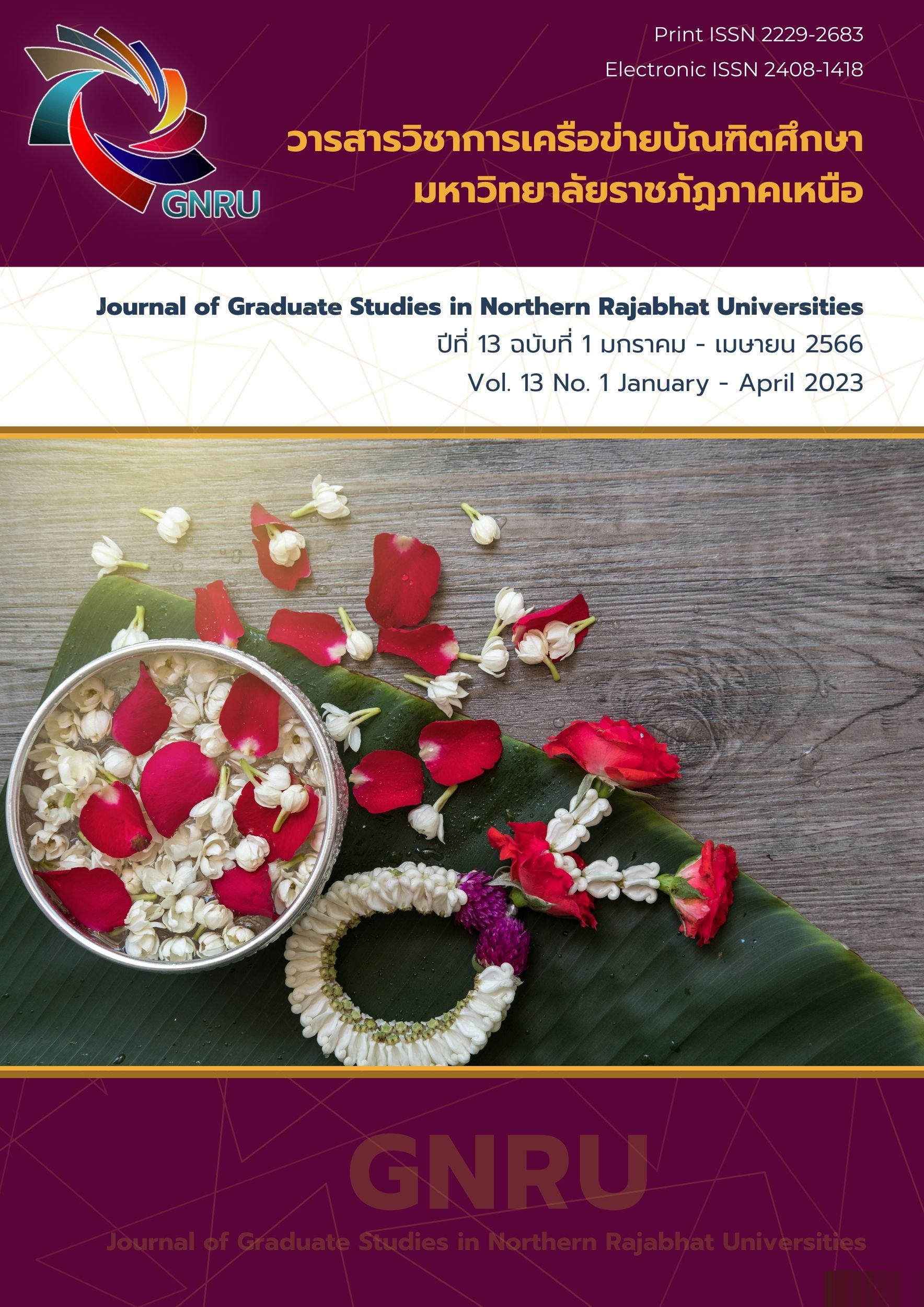THE DEVELOPMENT OF A HIGH-SCOPE LEARNING PATTERN WITH A REFLECTION PROCESS TO PROMOTE SYSTEM AWARENESS FOR STUDENTS OF RAJABHAT UNIVERSITY
Main Article Content
Abstract
The purpose of this research is to develop and experiment with the use of a high-scope learning management model with a reflection process to promote systematic cognition. It is a research and development process consisting of 3 steps: Step 1: Study and analyze the components of model development; Step 2: Develop and experiment with the learning management model; Step 3: Present the effectiveness of using the learning management model. The sample consisted of 23 Phetchabun Rajabhat University students using a one-group pretest-posttest design. The data were collected by employing a systems cognitive scale, a learning activity plan, and a satisfaction assessment form and analyzed by using a percentage and t-test. The results showed as follows: 1) The study and synthesis of elements of systematic cognitive development included 5 aspects: (1) the creation of thinking patterns, (2) systematic planning thinking, (3) self-inspection, (4) the creation of one's power, and (5) reflection on associative learning. The learning management model consisted of 6 stages, namely the learning planning stage, the step to learn from practice, the learning review, the knowledge summary, the knowledge exchange stage, and the reflection step. 2) The learning management model included 6 components: (1) principles, (2) objectives, (3) content, (4) teaching and learning process, (5) media and learning resources, and (6) measurement and evaluation of experimental results. The experimental results showed that after learning management, students had higher systematic thinking with significantly different at .05. 3) The satisfaction assessment results of using the High-Scope learning management model with reflection were at a high level (x = 4.49).
Article Details
References
กระทรวงศึกษาธิการ. (2560). หลักสูตรการศึกษาปฐมวัย พุทธศักราช 2560. กรุงเทพฯ: คุรุสภา
กัลยาแม้นมินทร์. (2558). การบริหารจัดการเทคโนโลยีสารสนเทศในโรงเรียน: คู่มือสำหรับผู้บริหาร. กรุงเทพฯ: โครงการเทคโนโลยีสารสนเทศตามพระราชดำริสมเด็จพระเทพรัตนสุดาสยามบรมราชกุมารีศูนย์เทคโนโลยีอิเล็กทรอนิกส์และคอมพิวเตอร์.
จักรกฤษณ์ จันทะคุณ. (2562). โครงการการพัฒนาหลักสูตรภัยพิบัติท้องถิ่นแผ่นดินไหวสำหรับโรงเรียนในพื้นที่เสี่ยงภัยแผ่นดินไหวด้วยการจัดการความรู้: รายงานวิจัยฉบับสมบูรณ์. สำนักงานคณะกรรมการส่งเสริมวิทยาศาสตร์ วิจัยและนวัตกรรม.
หน่วยศึกษานิเทศก์ สำนักงานคณะกรรมการการศึกษาขั้นพื้นฐาน. (2562). แนวทางการนิเทศเพื่อพัฒนาและส่งเสริมการจัดการเรียนรู้เชิงรุก (Active Learning) ตามนโยบายลดเวลาเรียนเพิ่มเวลารู้.สำนักงานเขตพื้นที่การศึกษามัธยมศึกษา เขต 35.
พัชรี ผลโยธิน และคณะ. (2550). การเรียนรู้ของเด็กปฐมวัยตามแนวคิดไฮสโคป. กรุงเทพฯ: สำนักงานเลขาธิการสภาการศึกษา.
รักชนก โสอินทร์. (2562). การพัฒนาการคิดเชิงระบบโดยใช้ชุดกิจกรรมการเรียนรู้แบบโครงงานรายวิชาสังคมศึกษา สำหรับนักเรียนชั้นมัธยมศึกษาปีที่ 3 โรงเรียนทีปราษฎร์พิทยา อำเภอเกาะสมุย จังหวัดสุราษฎร์ธานี. บัณฑิตวิทยาลัย มหาวิทยาลัยราชภัฏสุราษฎร์ธานี.
สราวุธ พัชรชมพู. (2560). การพัฒนารูปแบบการเรียนการสอนเพื่อเสริมสร้างความสามารถในการคิดเชิงระบบสำหรับนักศึกษาหลักสูตรประกาศนียบัตรวิชาชีพชั้นสูง. วารสารวิชาการเครือข่ายบัณฑิตศึกษามหาวิทยาลัยราชภัฏภาคเหนือ, 7, 117-132.
สรวงพร กุศลส่ง และฐิติโชติ กุศลส่ง. (2564). การพัฒนารูปแบบการเรียนรู้แบบโครงการโดยใช้ ICT เพื่อส่งเสริมความสามารถในการรู้คิดเชิงระบบสำหรับนักศึกษาคณะครุศาสตร์มหาวิทยาลัยราชภัฏเพชรบูรณ์. วารสารมหาวิทยาลัยขอนแก่น, 11, 142-169.
สํานักงานคณะกรรมการการอุดมศึกษา. (2550). มาตรฐาน ตัวบงชี้. (online). www.mua.go.th.
Checkland P. (2019). Sypstems Thinking, Systems Practice. Chichester, UK: John Wiley & Sons Ltd
Hohmann, M. & Weikart, D.P. (1995). Educating Young Children.United States of America :High/Scope Press.
Kreutzer, J.M.G.(2001). Foreword: Systems Dynamics in education. System Dynamic.Reviev, 9(2), 101-112.
Richmond, B. (2000). Toolbox reprint series: The thinking in systems thinking seven essential skills. Waltham Pegasus Communications.
Senge, P. M. (1990). The Fifth Discipline: The Art and Practice of the Learning Organization. New York: Doubleday.
Sternberg, R.J. &Grigorenko, E.L. (2007). Teaching for Successful Intelligence.2nd.Thousand Oaks, CA: Corwin Press.


